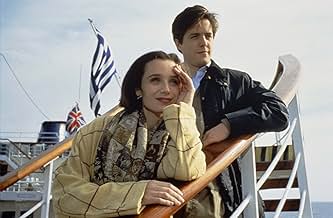Depois de ouvir suas histórias, um passageiro em um cruzeiro desenvolve uma paixão irresistível pela esposa de um paraplégico excêntrico.Depois de ouvir suas histórias, um passageiro em um cruzeiro desenvolve uma paixão irresistível pela esposa de um paraplégico excêntrico.Depois de ouvir suas histórias, um passageiro em um cruzeiro desenvolve uma paixão irresistível pela esposa de um paraplégico excêntrico.
- Direção
- Roteiristas
- Artistas
- Prêmios
- 1 vitória e 2 indicações no total
Danny Wuyts
- Bandleader
- (as Danny Garcy)
Nathalie Galán
- Girl in Boutique
- (as Nathalie Galan)
Jim Adhi Limas
- Thai Maître D'
- (as Jim-Adhi Limas)
Avaliações em destaque
I found this film extremely well done for several reasons I will nominate.
It debates some moral issues, how far is it acceptable for a society still full of consevative people, such as the one performed by Hugh Grant, to acept a relationship such as that of the main characters? It is totally at the border of normality (meaning normality not necessarily what's good but what's common). The film also touches strongly the theme of hipocrisie (probably wrong spelled, this word.) once more in the character of Hugh Grant who, despite showing all the time disgut and repugnace for the story he is being told, is always secretly desiring and wanting something equivalent to happen to him (this hipocratic attitude may be the result of growing up in a world and a society where this kind of sexual liberties and practices are repressed and in here once more we are taken to atrong moral issues which take us to rethink the whole thing...).
Apart from this questions this film makes me also think about the relationships between men and women... Is there an everlasting love? or at least an everlasting relationship?... Suddendly I recalled Schopenhauer who claimed that no man could be happy with only one woman... maybe this film is showing that he was right... the pace of the relationship between Mimi and the writer was so high that they just emptied all there possibilities very soon, but if we put that at the scale of a normal marriage, aren't all the possibilities also tried at the end of 10 20 or 30 years? Can a marriage last happy for both till "death tears them apart" ?...
Besides this few topics of discussion (to which I could add some more if I just remembered them right now) I found this film very well directed with some beautiful scenes... also some strongs scenes that stay with us... Excelent performances for the three leading roles... Kristin Scott Thomas is also good in here but not so as in other films also because her somewhat small part in this one didn't allow her to show more than she did. This film proves once more Roman Polansky as one of the greatest directors of our times, since he shows he is totally in control of every detail of direction (I enjoyed the increase of the speed together with the increase of intensity of the relationship among the couple). Good dialogues but specially excelent speeches of the writer whenever he becomes the narrator which is often... Also an excelent note for the soundtrack by Vangelis and other well known songs which appear along. A must see.
It debates some moral issues, how far is it acceptable for a society still full of consevative people, such as the one performed by Hugh Grant, to acept a relationship such as that of the main characters? It is totally at the border of normality (meaning normality not necessarily what's good but what's common). The film also touches strongly the theme of hipocrisie (probably wrong spelled, this word.) once more in the character of Hugh Grant who, despite showing all the time disgut and repugnace for the story he is being told, is always secretly desiring and wanting something equivalent to happen to him (this hipocratic attitude may be the result of growing up in a world and a society where this kind of sexual liberties and practices are repressed and in here once more we are taken to atrong moral issues which take us to rethink the whole thing...).
Apart from this questions this film makes me also think about the relationships between men and women... Is there an everlasting love? or at least an everlasting relationship?... Suddendly I recalled Schopenhauer who claimed that no man could be happy with only one woman... maybe this film is showing that he was right... the pace of the relationship between Mimi and the writer was so high that they just emptied all there possibilities very soon, but if we put that at the scale of a normal marriage, aren't all the possibilities also tried at the end of 10 20 or 30 years? Can a marriage last happy for both till "death tears them apart" ?...
Besides this few topics of discussion (to which I could add some more if I just remembered them right now) I found this film very well directed with some beautiful scenes... also some strongs scenes that stay with us... Excelent performances for the three leading roles... Kristin Scott Thomas is also good in here but not so as in other films also because her somewhat small part in this one didn't allow her to show more than she did. This film proves once more Roman Polansky as one of the greatest directors of our times, since he shows he is totally in control of every detail of direction (I enjoyed the increase of the speed together with the increase of intensity of the relationship among the couple). Good dialogues but specially excelent speeches of the writer whenever he becomes the narrator which is often... Also an excelent note for the soundtrack by Vangelis and other well known songs which appear along. A must see.
This movie, despite what many reviewers seem to think, is about the differences between men and women with respect to sex and love. Whether it is with Oscar and Mimi's intense, wild, no holds barred relationship, or with boring, bland Nigel and Fiona.
Generally speaking, men can have sex with any amount of women, in any way or intensity. If she is up for it, chances are we will be too. Women on the other hand, require more of an emotional connection to the men they sleep with. The need to develop trust and comfort before completely letting go.
Oscar is the ultimate poon hound and became instantly infatuated with Mimi. They start with a normal passionate relationship, but ultimately, the excitement wears off. This happens in any and every relationship. They hike up the intensity by getting into bondage, S&M, etc. All the while, Oscar is all to aware, they are heading for the their peak and once it hits the top, it is only down hill from there.
The thing is, for the man in this case, it is only about the sexual passion. The woman is truly in love and the sex is the connection to her man. Even when the sexual excitement wears off, Mimi is still in love.
So, enter the conflict. Oscar is done, wants out. Mimi can't handle it and doesn't understand why he could possibly not love her the way she loves him. He tries to be compassionate and break up but she refuses to be let go, ultimate agreeing to be his slave just to stay near him.
This story is being told to a couple who have also been together for 7 years and are off to reignite their marriage. I believe that the same factors are in play with the stuffy British couple, Nigel and Fiona but only in a far more repressed manner. He's bored because he and his wife are doing the "normal" thing. No wild, kinky sex for them. But the emotion of love is there. If a couple is going to stay together forever, they simply have to get over the fact that physical passion is fleeting and if the bond of love is strong on both sides, they can make it work. Nigel isn't clear on this until the climactic ending.
This commentary isn't so much on the details of the plot, but what I believe the movie is trying to get across. Read the other posts for more details, but to understand what the movie is saying, understand that sex is sex for men and sex is love for women.
Generally speaking, men can have sex with any amount of women, in any way or intensity. If she is up for it, chances are we will be too. Women on the other hand, require more of an emotional connection to the men they sleep with. The need to develop trust and comfort before completely letting go.
Oscar is the ultimate poon hound and became instantly infatuated with Mimi. They start with a normal passionate relationship, but ultimately, the excitement wears off. This happens in any and every relationship. They hike up the intensity by getting into bondage, S&M, etc. All the while, Oscar is all to aware, they are heading for the their peak and once it hits the top, it is only down hill from there.
The thing is, for the man in this case, it is only about the sexual passion. The woman is truly in love and the sex is the connection to her man. Even when the sexual excitement wears off, Mimi is still in love.
So, enter the conflict. Oscar is done, wants out. Mimi can't handle it and doesn't understand why he could possibly not love her the way she loves him. He tries to be compassionate and break up but she refuses to be let go, ultimate agreeing to be his slave just to stay near him.
This story is being told to a couple who have also been together for 7 years and are off to reignite their marriage. I believe that the same factors are in play with the stuffy British couple, Nigel and Fiona but only in a far more repressed manner. He's bored because he and his wife are doing the "normal" thing. No wild, kinky sex for them. But the emotion of love is there. If a couple is going to stay together forever, they simply have to get over the fact that physical passion is fleeting and if the bond of love is strong on both sides, they can make it work. Nigel isn't clear on this until the climactic ending.
This commentary isn't so much on the details of the plot, but what I believe the movie is trying to get across. Read the other posts for more details, but to understand what the movie is saying, understand that sex is sex for men and sex is love for women.
The British Nigel (Hugh Grant) and his wife Fiona (Kristin Scott Thomas) are celebrating the seventh anniversary of their marriage in a cruise to Istanbul and Bombay. While in the trip, the American cripple and frustrated writer Oscar (Peter Coyote) gets close to Nigel, and invites him to listen to his unconventional love and hate story with his French wife Mimi (Emmanuelle Seigner). Oscar tells how he met Mimi in Paris and all their relationship, including details of their sexual life, along the past years. Meanwhile, Nigel feels a great attraction for the sexy and gorgeous Mimi, in a story with tragic consequences.
'Bitter Moon' has been released in Brazil on DVD this week, and yesterday I watched it for the fifth or sixth time, since it is one of my favorites movies ever. This story, about relationship, moral, hypocrisy, behavior, love and hate, fascinates me and shakes my emotions. I really believe that 'Bitter Moon', Peter Coyote and Emmanuelle Seigner have been not nominated to the Oscar because of the problems of Roman Polanski with the American Justice. Emmanuelle Seigner has her best role and performance in his career playing Mimi, an adorable French woman, very much in love with Oscar, who poisons and destroys her. Their love increases, reaches the top and crosses all the boundaries of a sexual relationship, including those 'accepted by a moralist and hypocrite society' (represented by Nigel), questioning how long a love can last, making Oscar bored of Mimi. The problem is that their relationship was supported by sex only, without friendship and respect, basic parameters for a long-term everyday life of a married couple. Hugh Grant is perfect in the role of a typical British man and symbol of a hypocrite society. And Kristin Scott Thomas has a minor, but very important part in the plot, playing a sexually repressed woman due to the behavior of her husband, who released the chains of her repression. The wonderful music of Vangelis and a soundtrack of nice songs, which includes a Brazilian pop song, conclude this masterpiece. My vote is ten.
Title (Brazil): 'Lua de Fel' ('Bitter Moon')
'Bitter Moon' has been released in Brazil on DVD this week, and yesterday I watched it for the fifth or sixth time, since it is one of my favorites movies ever. This story, about relationship, moral, hypocrisy, behavior, love and hate, fascinates me and shakes my emotions. I really believe that 'Bitter Moon', Peter Coyote and Emmanuelle Seigner have been not nominated to the Oscar because of the problems of Roman Polanski with the American Justice. Emmanuelle Seigner has her best role and performance in his career playing Mimi, an adorable French woman, very much in love with Oscar, who poisons and destroys her. Their love increases, reaches the top and crosses all the boundaries of a sexual relationship, including those 'accepted by a moralist and hypocrite society' (represented by Nigel), questioning how long a love can last, making Oscar bored of Mimi. The problem is that their relationship was supported by sex only, without friendship and respect, basic parameters for a long-term everyday life of a married couple. Hugh Grant is perfect in the role of a typical British man and symbol of a hypocrite society. And Kristin Scott Thomas has a minor, but very important part in the plot, playing a sexually repressed woman due to the behavior of her husband, who released the chains of her repression. The wonderful music of Vangelis and a soundtrack of nice songs, which includes a Brazilian pop song, conclude this masterpiece. My vote is ten.
Title (Brazil): 'Lua de Fel' ('Bitter Moon')
This film is utterly compelling - it will have you glued to the screen. It's about 2 hours and 15 minutes long, yet it never loses its grip. Although there are a few "funny" moments, you can never be sure whether they were intentional or not. The pacing is slow but wonderfully methodical. But what really makes this picture delightful is the level of the acting of the male stars. While the female leads are also wonderful, the cynical Coyote and, especially, the charmingly shy Grant (his performance here is underrated) provide two different ways for the viewer to enter the story and their interplay is offbeat and endlessly entertaining. This is methodical, first-rate filmmaking by Polanski.
Roman Polanski again explores the depths of the human psyche in Bitter Moon, a magnificent epic tale of obsessive lust and the oh-so-familiar winding course of a passionate romance gone sour.
Bitter Moon centers around a familiar Polanski theme, that we are capable of being both torturer and victim, and usually both simultaneously. For anyone who doubts the validity of much of the past century of French intellectual thought, from the likes of Andre Gide, Foucault, and others, see this movie. For anyone who has been in a painful twisted relationship, see this movie. You will understand it. Some of it might be hard to stomach but that is the nature of truly great filmmaking.
A beautifully crafted movie, almost lyrical at times, Bitter moon is set in contemporary Paris but is told in a series of long complex flashbacks superbly narrated by Oscar (a terrific Peter Coyote) to Nigel (Hugh Grant as the usual British prat), both passengers on a cruise ship to India. Nigel and his wife Fiona, played by Kirsten Scott-Thomas, are on a holiday to enliven a stable but stale marriage. The couples become embroiled through the lurid tale of Oscar and Mimi's (Emmanuelle Seigner) love affair. Emmanuelle, Polanski's real-life wife, is superb and her incredible performance takes her from sumptuous beauty to complete wreck, a performance that deserves far more praise than was received. The lack of attention to her performance in this movie is no doubt due to the notoriety in the puritanical American press of her husband.
As a whole, Bitter Moon may not be Polanski's best film but some periods of the movie represent his very best work. Throughout, limits are pushed to the brink of tastelessness but Polanski masterfully pulls back just in time. The direction is complex and highly sophisticated and the movie arouses a range of emotions from dread to empathy to disgust to hilarity. The story line is far too complicated to synopsize appropriately in this review. Bitter moon is a great film, one of this reviewer's top 10 for the 1990s. Another must see! A word of caution, however, Bitter Moon is not a good date movie.
Bitter Moon centers around a familiar Polanski theme, that we are capable of being both torturer and victim, and usually both simultaneously. For anyone who doubts the validity of much of the past century of French intellectual thought, from the likes of Andre Gide, Foucault, and others, see this movie. For anyone who has been in a painful twisted relationship, see this movie. You will understand it. Some of it might be hard to stomach but that is the nature of truly great filmmaking.
A beautifully crafted movie, almost lyrical at times, Bitter moon is set in contemporary Paris but is told in a series of long complex flashbacks superbly narrated by Oscar (a terrific Peter Coyote) to Nigel (Hugh Grant as the usual British prat), both passengers on a cruise ship to India. Nigel and his wife Fiona, played by Kirsten Scott-Thomas, are on a holiday to enliven a stable but stale marriage. The couples become embroiled through the lurid tale of Oscar and Mimi's (Emmanuelle Seigner) love affair. Emmanuelle, Polanski's real-life wife, is superb and her incredible performance takes her from sumptuous beauty to complete wreck, a performance that deserves far more praise than was received. The lack of attention to her performance in this movie is no doubt due to the notoriety in the puritanical American press of her husband.
As a whole, Bitter Moon may not be Polanski's best film but some periods of the movie represent his very best work. Throughout, limits are pushed to the brink of tastelessness but Polanski masterfully pulls back just in time. The direction is complex and highly sophisticated and the movie arouses a range of emotions from dread to empathy to disgust to hilarity. The story line is far too complicated to synopsize appropriately in this review. Bitter moon is a great film, one of this reviewer's top 10 for the 1990s. Another must see! A word of caution, however, Bitter Moon is not a good date movie.
Você sabia?
- CuriosidadesJames Woods was cast in the role of Oscar, but dropped out.
- Erros de gravaçãoIn the scene when Mimi cuts her hair for the first time and bakes a Turkey for Oscar, he is wearing the same turtle necked blue sweater that was ripped off with a razor blade during a previous sex game.
- Versões alternativasThe version submitted to the India's CBFC made cuts to remove about 3 minutes of footage to achieve an 'ADULT' rating (Cert No.: 2729).
- Trilhas sonorasFever
Written by Otis Blackwell (as John Davenport) and Eddie Cooley
Performed by Peggy Lee
Courtesy of MCA Caravelle Music France
EMI France
Principais escolhas
Faça login para avaliar e ver a lista de recomendações personalizadas
- How long is Bitter Moon?Fornecido pela Alexa
Detalhes
- Data de lançamento
- Países de origem
- Idiomas
- Também conhecido como
- Luna amarga
- Locações de filme
- Empresas de produção
- Consulte mais créditos da empresa na IMDbPro
Bilheteria
- Orçamento
- US$ 5.000.000 (estimativa)
- Faturamento bruto nos EUA e Canadá
- US$ 1.862.805
- Fim de semana de estreia nos EUA e Canadá
- US$ 37.997
- 20 de mar. de 1994
- Faturamento bruto mundial
- US$ 1.862.805
- Tempo de duração2 horas 19 minutos
- Cor
- Proporção
- 1.85 : 1
Contribua para esta página
Sugerir uma alteração ou adicionar conteúdo ausente




























